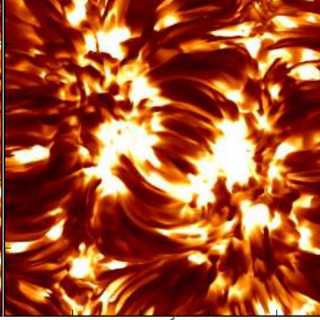Bibcode
Carlin, E. S.
Referencia bibliográfica
Astronomy and Astrophysics, Volume 627, id.A47, 18 pp.
Fecha de publicación:
7
2019
Revista
Número de citas
3
Número de citas referidas
2
Descripción
Context. The morphology of spectral line polarization is the most
valuable observable to investigate the magnetic and dynamic solar
atmosphere. However, in order to develop solar diagnosis, it is
fundamental to understand the different kinds of anomalous solar signals
that are routinely found in linear and circular polarization (LP,CP).
Aims: We aim to explain and characterize the morphology of solar
CP signals considering nonlocal thermodynamical equilibrium (NLTE)
effects. Methods: An analytical two-layer model of the polarized
radiative transfer equation is developed and used to solve the NLTE
problem with atomic polarization in a semi-parametric way. The potential
of the model for reproducing anomalous CP is shown with detailed
calculations and examples. A new approach based on the zeroes of
polarization signals is developed to explain their morphology.
Results: We have obtained a comprehensive model that insightfully
describes the formation of solar polarization with certain precision
without sacrificing key physical ingredients or resorting to complex
atmospheric models. The essential physical behavior of dichroism and
atomic orientation has been described, introducing the concepts of
dichroic inversion, neutral and reinforcing medium, critical intensity
spectrum, and critical source function. We show that the zero-crossings
of the CP spectrum are useful to classify its morphology and understand
its formation. This led to identification and explanation of the
morphology of the seven most characteristic CP signals that a single
(depth-resolved) scattering layer can produce. We find that a minimal
number of two magnetic layers along the line of sight is required to
fully explain anomalous solar CP signals and that the morphology and
polarity of Stokes V depends on magnetic, radiative, and atomic
"polarities". Some implications of these results are presented through a
preliminary modeling of anomalous CP signals in the Fe I 1564.8 nm and
Na I D lines.
Proyectos relacionados

Magnetismo, Polarización y Transferencia Radiativa en Astrofísica
Los campos magnéticos están presentes en todos los plasmas astrofísicos y controlan la mayor parte de la variabilidad que se observa en el Universo a escalas temporales intermedias. Se encuentran en estrellas, a lo largo de todo el diagrama de Hertzsprung-Russell, en galaxias, e incluso quizás en el medio intergaláctico. La polarización de la luz
Tanausú del
Pino Alemán